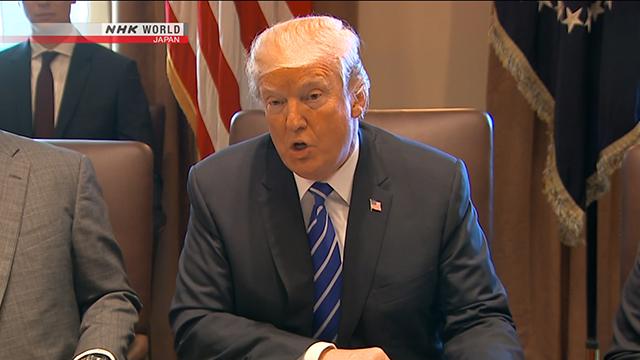President Donald Trump made the announcement on November 20th amid heightened international criticism of Pyongyang's nuclear and missile development programs.
He said, "In addition to threatening the world by nuclear devastation, North Korea has repeatedly supported acts of international terrorism, including assassinations on foreign soil."
Trump said the move would lead to more penalties for North Korea. It's already been hit with heavy international sanctions.
Other countries backed the move.
Japanese Prime Minister Shinzo Abe told reporters, "Japan welcomes and supports the US decision to designate North Korea a state sponsor of terrorism. The move will increase pressure on Pyongyang."
South Korea said Trump's decision could help with efforts to denuclearize the Korean Peninsula. It added that it will keep working with the US to get the North to come to the table for dialogue.
What the designation means
The US applies the designation to countries which it alleges have provided support for acts of international terrorism. Inclusion on the list means the country will be subject to US sanctions.
The sanctions include a ban on exports and sales of weapons from the US. They restrict exports and provisions of articles and services that could help sharply increase the recipients' military power and ability to support terrorism. They also ban US economic aid, and impose various financial restrictions.
The US first designated North Korea as a state sponsor of terrorism in 1988 following its bombing of a South Korean passenger jet the previous year.
But 20 years later, then-President George W. Bush removed North Korea from the list. His administration said it had reached an agreement with the North on how to verify its nuclear program.
Under the next president, Barack Obama, the US considered putting the North back on its list following the country's nuclear test and cyber-attack on a subsidiary of Japanese electronics giant Sony. But it postponed the move.
Members of Congress started calling for the blacklisting of North Korea again after an American college student died in June this year following his release from a North Korean prison. The North is also suspected to be behind the February killing of Kim Jong Nam -- the half-brother of the North's leader Kim Jong Un -- in Malaysia.
On November 2nd, National Security Adviser H.R. McMaster revealed that Washington was considering putting North Korea back on the list. He said the murder of Kim Jong Nam was clearly an act of terrorism.
Following the latest decision by Trump, 4 countries -- North Korea, Syria, Iran and Sudan -- are on the US list of state sponsors of terrorism.
Expert: The move will step up pressure on N.Korea
Bruce Klingner, who used to analyze North Korea for the CIA, and is currently a Senior Research Fellow at US think tank The Heritage Foundation, says the re-designation will help step up international pressure on North Korea.
Klingner notes the move will allow the US to also pressure firms and individuals that are legally doing business with the North, by asking them whether they want to be seen as having ties to a criminal country. Klingner stresses that this will support international efforts to cut off funding to North Korea.
Expert: The move is a symbolic gesture
Lisa Collins, a fellow with the Korea Chair at the Center for Strategic and International Studies, says the re-designation is unlikely to have a major direct impact as the US has already imposed many sanctions against North Korea.
Collins calls the move a symbolic gesture. She believes it's aimed at applying more pressure on the North to bring it back to the negotiating table to get it to scrap its nuclear weapons program.
At the same time, Collins warns the re-designation may anger North Korea and cause it to conduct fresh missile and nuclear tests. She notes this could hamper future talks.
